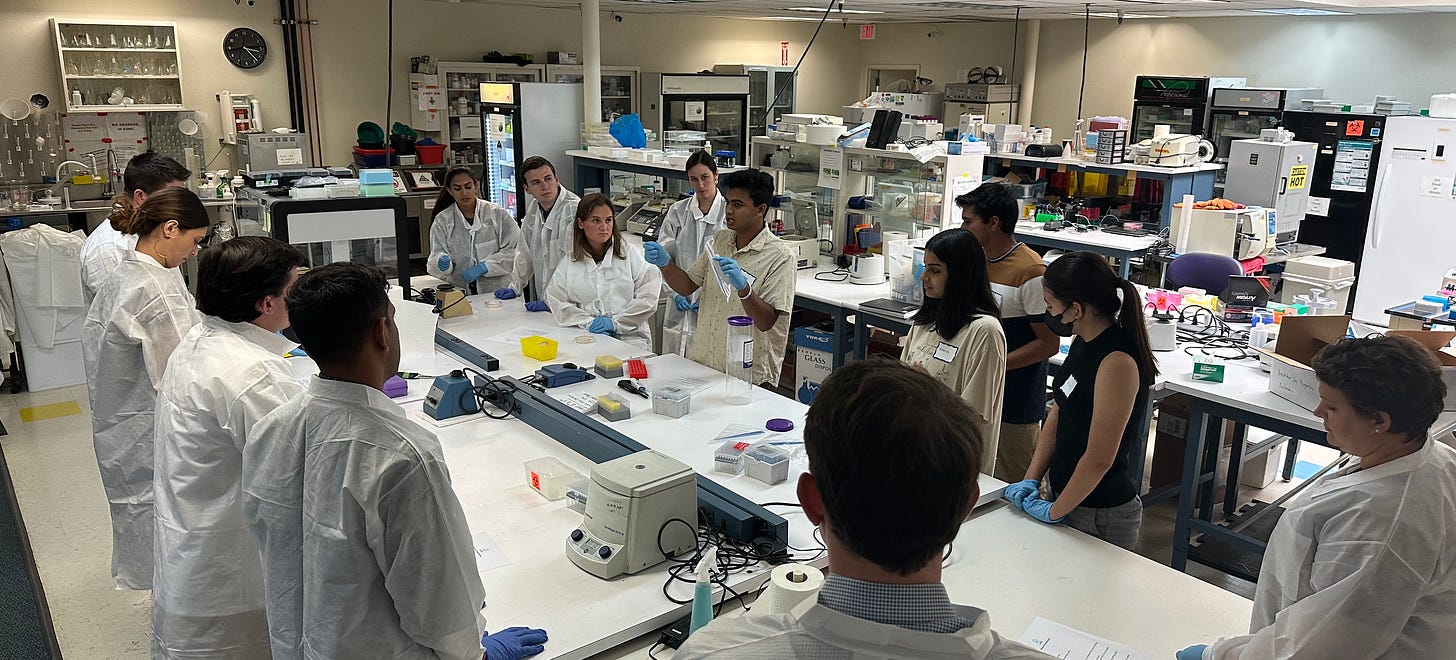Institute for Progress (IFP) — August 2023 Update
Hello!
Summer is winding down (gasp), and we have a couple new non-resident fellows joining the IFP team: Hamidah Oderinwale is joining us for the fall to work on immigration policy, and Maxwell Tabarrok will be working with our metascience team.
We just launched a new interview series, Statecraft, about how policymakers actually get things done. It’s a bimonthly newsletter of interesting stories, like how the US extracted weapons-grade uranium from post-Soviet states, or (in our first interview) how the US saved more than 20 million lives in Sub-Saharan Africa. Check out the introductory essay from Senior Editor Santi Ruiz and subscribe!
Here’s what else we’ve been tackling this month:
✍️ Published Work
Director of Science Policy Heidi Williams wrote an op-ed for The Washington Post on how Congress can help federal science agencies speed up scientific progress.
“The NSF and NIH are often criticized for delays. But at the end of the day, these agencies are constrained by what Congress allows them to do… Rather than throw up roadblocks, lawmakers should send the agencies — and the public — a message: Their paramount goal should be to accelerate scientific progress.”
A powerhouse team including Heidi, Co-founder Caleb Watney, Board Member Dan Correa, and Senior Fellows Matt Clancy and Paul Niehaus wrote in Nature about ways to bridge the scientist/policymaker divide.
“Just as Louis Pasteur’s work on pasteurization was inspired by observing manufacturers struggling with bacterial contamination of wine and milk, we see value in use-inspired research on science policy.”
Infrastructure Fellow Aidan Mackenzie argued that geothermal energy needs permitting reform.
“Geothermal energy presents an opportunity for American clean energy production that is almost too good to be true… It would be a shame if regulations originally designed to protect the environment killed geothermal energy while shielding oil and gas.”
For IFP, Jassi Pannu and Jacob Swett joined Fellow Janika Schmitt in analyzing how the new ARPA-H can accelerate progress in health tech by focusing on pandemic prevention.
“Creating a DARPA-style agency opens doors for transformative breakthroughs, but it does not guarantee them… We interviewed more than twenty experts from government, academia, and industry to discuss how ARPA-H can successfully commercialize technologies that benefit us all, while mitigating downside risks.”
In Matt Yglesias’ Slow Boring, Heidi and former CBO director Doug Elmendorf made a case for reconsidering rules about when to use dynamic budget scoring, focused on an example of how dynamic scoring would more correctly capture the positive federal budget impacts of high-skilled immigration
“For policies like increasing high-skilled immigration that induce economically meaningful changes in employment and productivity, conventional scores misrepresent the true effects on the federal budget implied by existing evidence. Rather than seeing dynamic scoring as a conservative agenda, those invested in spurring economic growth should pay attention to cases where dynamic scoring would help align the incentives of Congress with the policies that are best for society.”
🎤 Interviews & Events
Biosecurity Fellow Arielle D’Souza and Co-founder Alec Stapp led a congressional staff delegation trip to the Bay Area to tour a community biolab and participate in discussions with biosecurity experts on topics such as gene synthesis, medical countermeasures, advanced PPE, indoor air quality, wastewater surveillance.
The trip included five Republican and five Democratic staffers, half from the House of Representatives and half from the Senate.
Co-founder Caleb Watney joined R Street’s Adam Thierer on the “Tech Roundup” podcast to explore the United States’ approach toward high-skilled immigration.
📰 Media
Heatmap cited Senior Infrastructure Fellow Brian Potter’s work in a piece on government pull mechanisms.
“The government has previously used its power as a purchaser to speed up the development of semiconductors, titanium, and — most recently — COVID-19 vaccines. As a piece of industrial strategy, the new program will give the government a lever to shape the market and set standards for the emerging climate technology.”
IFP’s work on the costs of NEPA was referenced in a Semafor piece about permitting reform.
In his newsletter Faster, Please!, AEI’s Jim Pethokoukis interviewed Aidan about geothermal energy and the regulatory roadblocks it faces.
The New York Times also cited Aidan’s work on geothermal in a piece on the race to deploy advanced drilling techniques.
“Permitting is tough. While enhanced geothermal could, in theory, work anywhere, the best resources are on federal land, where regulatory reviews take years and it’s often easier to win permission for oil and gas drilling because of exemptions won by fossil fuel companies.”




